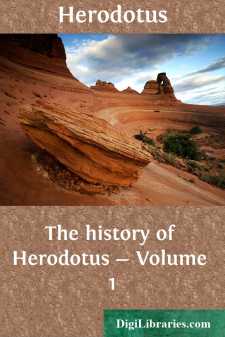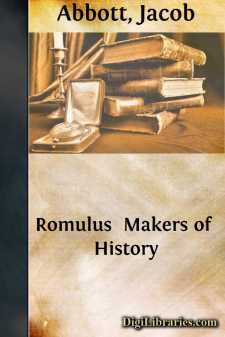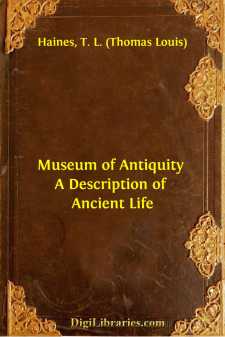History
- Africa 30
- Americas (North Central South West Indies) 50
- Ancient
- Asia 58
- Australia & New Zealand 8
- Canada 41
- Caribbean & West Indies 1
- Civilization 20
- Eastern Europe 12
- Europe 310
- Expeditions & Discoveries 60
- General 77
- Historical Geography 1
- Jewish 9
- Latin America 3
- Medieval 8
- Middle East 13
- Military 248
- Revolutionary 8
- Study & Teaching 5
- United States 353
- Western Europe 56
- World 13
Ancient Books
Sort by:
by:
Herodotus
PREFACE If a new translation of Herodotus does not justify itself, it will hardly be justified in a preface; therefore the question whether it was needed may be left here without discussion. The aim of the translator has been above all things faithfulness—faithfulness to the manner of expression and to the structure of sentences, as well as to the meaning of the Author. At the same time it is...
more...
THE WANDERINGS ANDHOMES OF MANUSCRIPTSTheWanderings and Homes of Manuscripts is the title of this book. To have called it the survival and transmission of ancient literature would have been pretentious, but not wholly untruthful. Manuscripts, we all know, are the chief means by which the records and imaginings of twenty centuries have been preserved. It is my purpose to tell where manuscripts were...
more...
INTRODUCTORY ESSAYHELLENISM AND HEBRÆISM IN EGYPT UNDER THE PTOLEMIESI.When Alexander the Great bridged the gulf dividing Occident and Orient, the Greeks had attained to a state of maturity in the development of their national art and literature. Greek culture and civilisation, passing beyond the boundaries of their national domain, crossed this bridge and spread over the Asiatic world. To perpetuate...
more...
CHAPTER I ASSYRIAN HISTORIANS AND THEIR HISTORIES To the serious student of Assyrian history, it is obvious that we cannot write that history until we have adequately discussed the sources. We must learn what these are, in other words, we must begin with a bibliography of the various documents. Then we must divide them into their various classes, for different classes of inscriptions are of varying...
more...
by:
Cassius Dio
(BOOK 52, BOISSEVAIN) [-1-] My record has so far stated what the Romans both did and endured for seven hundred and twenty-five years under the monarchy, as a democracy, and beneath the rule of a few. After this they reverted to nothing more nor less than a state of monarchy again, although Cæsar had a plan to lay down his arms and entrust affairs to the senate and the populace. He held a consultation...
more...
by:
Jacob Abbott
CADMUS. B.C. 1500Different kinds of greatness.Some men are renowned in history on account of the extraordinary powers and capacities which they exhibited in the course of their career, or the intrinsic greatness of the deeds which they performed. Others, without having really achieved any thing in itself very great or wonderful, have become widely known to mankind by reason of the vast consequences...
more...
by:
H. B. Dewing
HISTORY OF THE WARS: BOOK V I Such, then, were the fortunes of the Romans in Libya. I shall now proceed to the Gothic War, first telling all that befell the Goths and Italians before this war. 474-491 a.d.During the reign of Zeno Byzantium the power in the West was held by Augustus, whom the Romans used to call by the diminutive name Augustulus because he took over the empire while still a lad,July 31,...
more...
INTRODUCTION Tacitus held the consulship under Nerva in the year 97. At this point he closed his public career. He had reached the goal of a politician's ambition and had become known as one of the best speakers of his time, but he seems to have realized that under the Principate politics was a dull farce, and that oratory was of little value in a time of peace and strong government. The rest of...
more...
by:
Oliver Goldsmith
CHAPTER I. GEOGRAPHICAL OUTLINE OF ITALY. Italia! oh, Italia! thou who hastThe fatal gift of beauty, which becameA funeral dower of present woes and past,On thy sweet brow is sorrow plough'd by shame,And annals traced in characters of flame.—Byron. 1. The outline of Italy presents a geographical unity and completeness which naturally would lead us to believe that it was regarded as a whole, and...
more...
Address to the Mummy. "And thou hast walked about, (how strange a story!)In Thebes' streets three thousand years ago,When the Memnonium was in all its glory,And time had not begun to overthrowThose temples, palaces and piles stupendous,Of which the very ruins are tremendous."Perhaps that very hand now pinioned flat,Has hob-a-nobbed with Pharaoh, glass to glass;Or dropped a half-penny in...
more...











